Text
10. Eighth Grade

Of all the movies on this list, this is the one I’m least likely to watch again soon. It’s so uncannily observed, it’s like watching memories. Awkward, terrible memories - of being self-aware enough to know what being cool and confident would look like, but too self-aware to actually BE cool and confident.
In some ways, middle school has changed since I was its victim in the mid-90’s. I could, and did, avoid unwanted attention by sticking to a few simple, easy-to-follow rules like - don’t speak unless spoken to and sometimes not even then. And - if you don’t move, they can’t see you.
That’s also part of the chosen survival strategy for Kayla, the 13-year-old protagonist of EIGHTH GRADE. But in 2018, in-person invisibility is only half the battle. She’s also expected to exist in the online space, and the barrier to entry is creating an avatar. A second Kayla, who looks like her IRL counterpart, but acts like she’s already mastered that which Kayla has only just begun to understand.
But EIGHTH GRADE - which was written and directed by former YouTube star Bo Burnham - isn’t a facile adult’s-eye-view of Inauthentic Online Adolescence. When Kayla (Elsie Fisher) looks straight to camera in the videos she posts, she may be playing a part, but she’s also taking a risk. She’s impossibly vulnerable, but she’s also brave. In some ways, she finds herself, over the course of the film, through performance - and not by dropping the act.
The message of the movie might be - it’s possible to be both. It’s possible to be your aspirational self and your present self at the same time. It’s possible to protect yourself without shutting down entirely, and to let people in without breaking in two. I’ve often joked that I had an inflamed sense of injustice when I was in middle school. But maybe the stakes felt so high because they really were that high.
There’s more on the line for Kayla in that one scene at the pool party, than for the Avengers when Thanos was threatening half the world in AVENGERS: INFINITY WAR. I could hardly stand to watch - but I couldn’t look away.
0 notes
Text
9. Isle of Dogs

It’s an urgent call to resist Fascistic fear-mongering starring claymation dogs. It’s anti-propaganda, deeply empathetic and pro-love. Nearly every one of its characters contains depth, nuance, humor and pathos. And it’s set in Japan both as a tribute to the nuclear-unease era monster movies that flourished there in the middle of the last century, and as a grim comic commentary on the accidents of history that have led America to commit xenophobic atrocities under the cover of our own exceptionalism.
These are some of the things I believe about ISLE OF DOGS, but when it was released in March - all that was obscured by another, entirely-worthy debate about its aesthetic. The film was co-conceived and written by a prominent Japanese designer, but its lead author is clearly Wes Anderson. So does he, as a white American (a Texan, no less) have the right to traffic in the imagery of another culture? Even if he chose to utilize Japan’s iconic cinematic tropes out of love - is imitation an inherently colonial impulse?
It’s an undeniable good that we’ve arrived at a cultural moment where those questions are constantly being asked. But in this case, I think the conversation served to obscure, rather than illuminate, the art object being discussed. For example, the choice to “Americanize” the dogs, even as most of the humans in the film speak Japanese, strikes me as an effort to illuminate the communication gap that often allows the powerful to “otherize” their victims, by eliminating their voices from the conversation. I also think the way the movie’s one American character - Tracy, voiced by Greta Gerwig - takes credit for the ingenuity of our heroic lead human - Atari, voiced by Koyu Rankin - is meant as a pointed satire of the western self-absorption Anderson has been accused of.
It’s also true - although not exclusively so - that many of the film’s defenders are, in fact, Japanese. And many of those condemning it are not, although they seem to feel qualified to speak for Japanese people. As if the way the movie made them feel is a bellwether for how it must, they think, make Japanese people feel.
I’m obviously no more qualified to understand the depths of this debate than those writers are. And maybe I’m inclined to be generous to ISLE OF DOGS because of my love for its characters, or its wry humor. Maybe my love for dogs is obscuring my faculties. It could be as simple as that.
But the more I think about it, the more I’ve come to believe the movie and its critics are on the same side. That they share the same urgent anti-colonialist message. And that time will be kind to ISLE OF DOGS.
0 notes
Text
8. Blindspotting
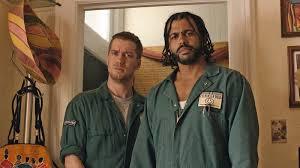
There were at least 6 movies this year explicitly about America’s racial tensions, and several more where race plays an important role. It makes sense emotionally, as recent events have shone a light where some of us have been reluctant to see. And it makes sense narratively. There’s something inherently compelling about watching characters navigate the specific details of their lives, in light of large-scale catastrophes that they can’t control.
Sometimes, in movies, that’s a natural disaster. In ancient tales, it was often the capriciousness of the Gods. BLINDSPOTTING, in my view, was the most compelling example of that kind of story - dealing with the man-made tragedy of America’s criminal justice system. Which can feel, to those who get caught up in it, like a force as strong as time itself.
BLINDSPOTTING starts out like a stoner comedy. Collin and Miles (real-life friends Daveed Diggs and Rafael Casal) work together for a moving company in Oakland. Collin’s close to finishing out his parole. Miles likes to party. Collin’s trying to get back together with his ex. You might wonder if you’re watching the heir to DUDE, WHERE’S MY CAR?, or WEEKEND AT BERNIE’S. Wacky adventures seem prime to ensue.
Even in stoner comedies, it’s often the threat of violence that makes us uncomfortable enough that we have to laugh. This time, the threat turns out to be real - and it comes from the police. How brilliant of the film’s writers and directors to be able to make that turn. To introduce a paranoid, neurotic character for us to identify with - and then prove him right.
As the film goes on, and Collin’s life gets more pressurized, more intense, more like living through an earthquake, we revisit some of the charming details and characters we met at the start and see the danger they pose. We hear about the crime that led to his incarceration unfold as a legendarily bit of anti-gentrifying hilarity - as told by clueless bros - while the actual event plays out before our eyes, and plays as dark, and desperate, and disturbing.
That sequence - and another one at a party where Miles’ volatility bursts into violence and his privilege saves him. And another, where Collin confronts the figure of his nightmare not with violence, but with a blistering rap performance which is entirely unrealistic and yet somehow perfect for the film. These are among the best-directed scenes of the year. It’s DO THE RIGHT THING, more than any other movie, that BLINDSPOTTING is an heir too, for how it gets at the difficulty of just living.
We’re left with Collin, going for a run - trying to outrun. But he can’t, and neither can we.
0 notes
Text
7. Leave No Trace

This one starts like a vacation, but there’s at least one character at its center who feels he can never go home.
We know only his first name (Will, played by Ben Foster), and that’s probably more than he’d want us to know. We see him primarily through the eyes of his daughter (Tom, played by Thomasin McKenzie), who he’s making in his own image. They live in the woods, off their wits. A system for everything, survival the goal. Will makes sure they never get too comfortable, they always keep moving. Early on, Tom sees a plastic necklace in the dirt, and she wants it. Will says no. Wait for nobody else to claim it. They can’t be detected. It’s one of the first indicators that this is no camping trip.
Inevitably - the idyll is shattered. Father and daughter are forced out of the woods, and into society. The authorities, at first, are portrayed facelessly and like a threat. It reminded me, of all things, of similar chases in E.T. But then they gradually come into focus. Is it so bad, what their asking? For Tom to go to school, for Will to get a job, that they live under a roof?
“I’m not like you”, Tom eventually says to her father - at a moment when it seems his love might be curdling into something far more toxic. When he seems, all at once, to need her more than she needs him. When her trust in him is at risk of breaking under the weight of his inability to trust in anyone or anything else.
And then, towards the end, the film’s true subject is revealed. We don’t know what Will was like before he went to war - but we know he wasn’t like this. There are many occasions on which Will is treated with sensitivity and kindness. Society, in the form of kind neighbors, tries to make it up to him. What he’s lost. But LEAVE NO TRACE leaves it an open question, whether that’s even possible.
For nearly 20 years now, we’ve been living in a state of hypervigilance in this country. Will is just the tip of the spear. As this film shows, with grace, that’s bound to take a toll. Including on those young enough that they’ve never known anything different.
0 notes
Text
6. First Reformed
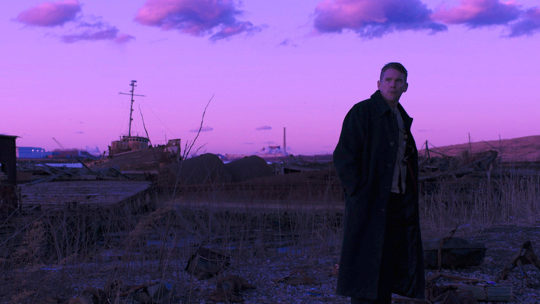
Jesus, this is tough.
That’s what I thought while watching FIRST REFORMED, and it’s also the underlying sentiment Ethan Hawke’s anguished priest expresses, as he’s increasingly electrified and illuminated by rage at man’s indifference to the earth God gave us.
Paul Schrader’s movie is in some ways a radical document. It puts us in the mindset of a person increasingly unable to function due to the intensity of his pain. Or in his view, due to the intensity of suffering he’s surrounded by, and which he’s only now becoming aware of.
The priest is part of a megachurch, but that’s not where he works. His outpost is mostly a gift shop. A historic church in upstate New York which mostly draws tourists, rather than worshippers. The rural milieu and Hawke’s loneless as described in voice-over, in his diary, has led many critics to view FIRST REFORMED as a riff on Bresson’s DIARY OF A COUNTRY PRIEST. On many levels, it is. The collar feels like a noose to Hawke, just as it did to Claude Laydu in that film.
But if he feels dead inside, the collar is also his entree into the land of the living. And the films FIRST REFORMED made me think of the most are old film noirs. The story -- an ingenue in trouble, played by Amanda Seyfried, comes to our priest for help with her missing husband. Who, in this case, is only spiritually lost. Our priest puts aside his cynicism to help - somehow cured and softened by the way she looks at him.
���Down these mean streets must go a man who is not himself mean”. That describes Ernst Toller, the character played by Hawke, as well as it does Philip Marlowe, in the words of Raymond Chandler. And as with Marlowe, Toller’s trauma is electrified to the fore by what he finds.
Seyfried’s husband is a desperate man. He’s on the run, not from the mob but from the future. A future which he sees as lost, because of humanity’s failure to live up to its moral responsibilities. His hang-up is the environment, but his real pain seems to be the indifference with which humanity is greeting evidence of the suffering it’s caused. And the guilt he then feels for himself being human.
Without getting into spoilers - I’ll just say the feeling is contagious. And even though the path the priest takes is extreme, and difficult to endure both for him and for us… FIRST REFORMED is above all things vibratory with empathy. And that makes it an important film for our moment… when that impulse sometimes seems to be slipping away.
0 notes
Text
5. Happy as Lazzaro

I was captivated from the start of this one, the latest from the Italian director Alice Rohrwacher - but I was also cringing. It’s hero - who appears at first as only a small part of an ensemble, in what appears to be a neo-realist riff on village life - is the kind of young man who’s historically been the focus of overly reductive inspiration narratives.
He’s so trusting and good, that we’re tempted to diagnose him. Not with an actual disability but with the kind of disability seen only in media - the symptoms of which include Existing Only to Inspire Others. When he befriends the son of the local countess, it could be the start of a cringeworthy buddy picture - a sort of magical realist RAIN MAN.
But that’s not what happens. I don’t want to reveal too many details, but suffice it to say it involves the intrusion of modernity and a kind wolf. And then a leap forward in time that makes it clear Lazzaro isn’t at all what we imagined him to be. He is instead a witness - close in spirit to the angels imagined by Walter Benjamin and portrayed in WINGS OF DESIRE, and in personality to Chance the Gardener in BEING THERE.
And like those characters, what he witnesses a sort of cruelty baked into the Darwinian structures of modern life. And in particular in the way Europe has treated its refugees. His lack of comprehension for dishonesty puts hypocrisy to shame. In a lesser film, his open spirit would then open the eyes of the villains of the world. Muggers would decide not to mug, etc. HAPPY AS LAZZARO is wise enough to know it’s not that simple. It’s going to take a lot more than a kind observer to fix this mess we’ve gotten ourselves in.
0 notes
Text
4. Roma
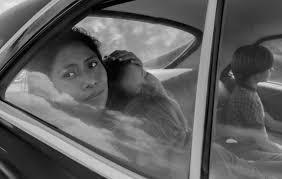
It’s not an act of radical empathy, like some reviews have suggested. It’s just a year or so in the life of a young woman in turbulent times.
Cleo (Yalitzia Aparicio in my favorite performance of the year) is the housekeeper for a well-off family in Mexico City in 1971. They’re not unkind, but they’re oblivious, as the story begins. She’s beloved, but as a symbol of comfort more than as a human being. Others have noted how - when the family’s grandmother comes down for breakfast early on - she fails to greet Cleo with a hello. Why greet the furniture? The family’s mother, too, seems too busy to notice her.
But then employer and employee are united in cataclysm - as each find themselves with new responsibilities thanks to the selfishness of men. We almost never leave Cleo’s side - as she discovers she’s pregnant, as she seeks out the father. As she’s forced to play a larger role in the family she works for, who have themselves been abandoned. We never leave her as her journey takes her into hospitals and villages, as she grows stronger in her suffering. As the forces of history close in on her and the children she cares for, threatening to breach the walls of the shelter they’ve built.
For that reason, the Cuaron film ROMA most reminds me of isn’t Y TU MAMA TAMBIEN - another highly personal memoir of Mexico. It’s CHILDREN OF MEN. It isn’t the apocalypse Cleo is dealing with, but it’s a world of immense uncertainty, and here she is trying to bring a child into the chaos. And as in CHILDREN OF MEN, there’s always the threat of proverbial barbarians at the gate - in this case, not terrorists but neo-Fascists, who in real life were being trained by the CIA at the time.
I could write also, about the religion of the film - which isn’t Christianity so much as a belief in the messages the universe can send us. There are earthquakes and fires. Even a spilled glass of wine portends the spilling of blood, later on. And I could write, as many have, about the bravura sequences in a single take, revealing the speed with which life invades us.
But maybe it’s better to end at the beginning, with the film’s very first shot. It’s of tiles on a driveway, and the soapy water - another omen - which washes over them like a wave. And an airplane which appears then in a puddle left behind by the water. I had the feeling, by the end, that the real Cuaron was on that plane, leaving this world behind. But that here - he wanted to linger at home, instead.
0 notes
Text
3. Can You Ever Forgive Me?
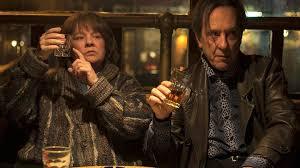
Towards the start of CAN YOU EVER FORGIVE ME?, Lee Israel (Melissa McCarthy) goes to a party looking for a book deal, and winds up committing larceny instead. It’s a funny scene. But it’s also the character in microcosm.
She starts out nice, but her host (who’s also her agent) greets her like she’s an unfriendly ghost come to haunt the place. So she proceeds to act like one, scoffing around the corners, manipulating objects (drinks, mostly), and scowling at the other guests like they’re intruders. The larceny starts as a secret. Toilet paper, stuffed into her satchel. Her pain is apparent, but it hasn’t yet gone public. Then she gets into another fight with her agent - brings up the toilet paper, because what good is rebellion if nobody knows you’re doing it - and absconds on her way out with a winter coat. Things have escalated. But now she’s got a skip in her step. Crime has paid. And she’s gotten away with it.
Melissa McCarthy plays all of this flawlessly, as she does every scene in the movie. The pattern will repeat with her brief career as a literary forger, and even in the progression of her friendship with Jack Hawk (Richard E. Grant), which is in its own way an act of escalation and crash. Of reaching out and lashing out. It’s destructive, most of all to Lee, who’s consistently worse off for her misanthropy.
But remember how the scene in the party ends. Skip in the step.
In love, Lee’s a hopeless romantic ruled by fear. We watch in anguish as she pushes away a potential suitor (a heartbreaking Dolly Wells), and in recognition as an ex (Anna Deavere Smith) chooses not to forgive her for doing the same to her years ago.
As a reader and a writer, she’s a hopeless romantic ruled by nostalgia. The old days make her laugh, and maybe part of the reason she does what she does - is to prove to herself she can be part of that world. That unlike the present moment, THAT’s when she would have shined. That there’s a place for her - even if now it’s mostly populated by the dead.
But it’s my theory that Lee’s true calling - the one we see her practice at the party, and throughout the film - really is crime. It’s not that she wants to cause people real pain, necessarily. I don’t think, if allowed to continue, she would have become a Walter White of the book world, crushing fingers in typewriters. But putting one over on people. Proving she’s smarter. Paying her bills without having to shovel shit, as she puts it.
That really does seem to bring her joy. And she never expresses a single regret about it. Even the existence of this film, based on her memoir, is proof her actions brought her more rewards than suffering. How great to find a movie that admits there are some people for whom wrong really is just right.
0 notes
Text
2. The Favourite

This movie has subterfuge and duck races, and that alone would have been enough. Dayenu.
It has four of the best performances of the year, by Olivia Colman, Emma Stone, Rachel Weisz and Nicholas Hoult, and that alone would have been enough. Dayenu.
It contains some of the best zingers of any movie this year, and also break dancing, without seeming at all ahistorical. And that alone would have been enough. Dayenu.
It’s a pungent (sometimes literally) satire of the the way power can not only corrupt but also decay (again, sometimes literally), and that alone would have been enough. Dayenu.
But the biggest reason Yorgos Lanthimos’ THE FAVOURITE is so high on this list is the way it honors the desperation of its characters. And the Dickensian deftness with which is sews a critique of the distorting effects of inequality and misogyny into what could have been a faux-theatrical chamber drama.
That, and the pathos of the bunny rabbits - a reference you’ll have to see the film to get. The way their cute little faces are witness to such Machiavellian maneuvers, that alone would have been enough. And so it is. Dayenu.
0 notes
Text
1. Widows

In a year or so, when WIDOWS is available to rent and showing up frequently on cable TV, everyone will be talking about how great it is. How propulsive and entertaining as a thriller, how trenchant as political commentary, how smart in its satire of the roles women are traditionally asked to play, in film and in life.
It’s got a Sidney Lumet vibe. A little grimy, but still romantic about the city - which in Lumet’s case was often New York, and in this case is Chicago. The film’s heist has to take place in a fully-realized world, or it would feel empty, like an exercise in style. And director Steve McQueen and writer Gillian Flynn deliver. The action has weight, because we know the players - and we know what’s at stake.
Daniel Kaluuya is in WIDOWS, as maybe the most terrifying movie villain since Anton Chigurh in NO COUNTRY FOR OLD MEN. Robert Duvall is here, as a toxic, racist old man who represents the old power in the city, an avatar for the fear that runs it. But the person who should be getting more awards attention is Elizabeth Debicki - who spends most of the movie pretending to be what others want her to be, while still showing us she knows exactly what she’s doing.
I put it at number one on this list - and this is typical for me - because it’s the one I’ll most want to watch again and again. I think it’s the best-made movie of the year. It’s also my favorite movie of the year, as an experience. It’s what older Academy voters have been known to call “a real MOVIE movie”, although inexplicably it’s looking like they might not be saying that about WIDOWS this year.
And it’s got a hell of a twist in the middle, perfectly-judged. It involves Viola Davis’ pet dog, who may well be the real hero of the piece. If you haven’t seen WIDOWS, you’ll just have to watch it to find out what I mean. I think you’ll love it.
0 notes
Text
Loving: History Written in Closeups

A film that could have been subtitled “Why We Fight”.
In a year when every movie was analyzed for its relationship to our historical moment -- this is the one that seemed the most uncannily relevant.
It begins in closeup... as a love story. Two people closer to each other, in some ways, than they are to themselves. Out of will or ignorance, or some combination of the two, they see no reason why they shouldn't be allowed to get married. Make a home. Have a family. In these scenes Joel Edgerton and Ruth Negga are perfect.
Then the movie zooms out. When we meet the Lovings' families, we find warmth, but we also see worry in their faces. When we meet the Lovings' neighbors, we see why. The movie becomes a story about bullying and about hate. When police break down the Lovings' home and drag them from their bed, it's a painful, powerful portrayal of the political becoming personal. Here is what happens, the movie seems to say, when racial hatred is allowed to metastasize into law.
I've seen reviews of this movie that marvel that these outrages were committed in America, and so recently. Of course, being shocked is a privilege. We as a nation own these injustices, and the violence inflicted upon the Lovings.
But we also own their deliverance. In the story's final act, when it zooms out even further, and the eyes of the nation are on the Lovings' case -- The Supreme Court does find in their favor, and they are able to make a home. It's an outcome we know from history books, and which can feel inevitable in retrospect. But it's a testament to the film's power that by the time that catharsis actually comes... we have forgotten to see it coming.
No other movie this year reminds us more starkly what it takes to live in a just world. What can be endured; and what can't.
(Written and directed by Jeff Nichols. Starring Ruth Negga, Joel Edgerton, Nick Kroll, Jon Bass, Martin Csokas, and - nailing it as usual - Michael Shannon).
1 note
·
View note
Text
La La Land: It’s Actually Really Good
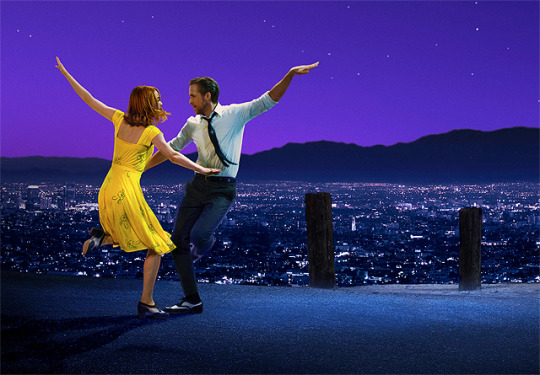
A movie with “a real knack for world-building”.
Some of the best movies of 2016 burrow deep into the times we live in. Some, though, exist almost entirely outside time. "La La Land" falls into the second category. It's ostensibly set in present-day Los Angeles, but it really just takes place in The Movies -- an imaginary time and place I'd like to live in, or at least visit.
It's been compared most frequently to "Singin' in the Rain", or Jacques Demy's "The Umbrellas of Cherbourg", and it is mournful like those films, and romantic like those films, and satirical like those films. The “dream ballet” sequence, towards the end, is graceful like those films, and has that same kind of hallucinatory logic. But the movie musical it reminded me of most often, was "The Muppets".
That’s not because "La La Land” would be just as good starring Muppets -- although it probably would be. It's because of the buoyant devotion it shows to showbiz -- long on show, short on biz. In the world of “La La Land”, artificiality is not an enemy of authenticity. It’s a form of authenticity.
That holds true not just for the showstoppers - but for the love story, too. The meet cute? It’s an act. It’s only when they play together that they find their true chemistry. And it’s when their artistic lives diverge.. that the tenor of their relationship and the film itself gets chilly, and difficult, and sad.
I’ve heard complaints about Gosling and Stone. And it’s true that the singing and the dancing isn’t as technically proficient as you’d find on Broadway. But the movie isn’t about proficiency. It's about being so bowled over with emotion that you can’t help but perform. For that - they’re perfectly cast.
I also think this movie is deeper than it gets credit for. The story may be built from cliches, but for the reasons described above - I see that as a choice. And the execution is idiosyncratic, and poignant -- especially towards the end, when Chazelle makes a formal choice that I genuinely did not see coming. For a minute there - watching it unfold - I lost myself entirely. I found myself getting emotional entirely on behalf of imaginary strangers. That’s rare, I think. I consider it a gift.
(Written and directed by Damien Chazelle. Starring Emma Stone, Ryan Gosling, John Legend, Rosemarie DeWitt, Sonoya Mizuno, Callie Hernandez, and Tom Everett Scott, of all people.)
0 notes
Text
Arrival: Time Is On Our Side
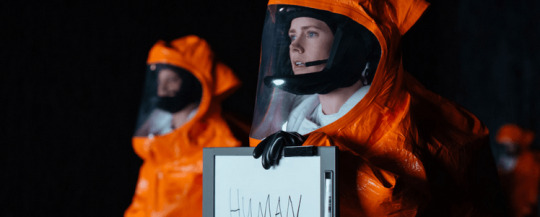
A genre entertainment with surprising resonance.
Here's a story about a world pulsing with suspicion and fear, on the brink of disaster. How do thoughtful people operate, in an atmosphere like that?
When we enter the story - from a brilliantly oblique angle - doom and hope are locked in battle, and doom is winning just by running out the clock. It's as if we - drafted to team hope by a brittle, reasonable Amy Adams - are members of a resistance. We are living inside a story familiar from at least a dozen other apocalyptic sci-fi blockbusters... but we're there as apostates from the death cult. Unlike so many tales of the apocalypse - “Arrival” does not suggest brutality as a path to deliverance.
I won't get into spoilers. The film’s intricate structure arms us only with a flashlight in a tunnel. We’re like the story’s heroes - disoriented, but driven to engage with whatever is about to come next. The last half hour in particular - is as breathless as any thriller that’s come out this decade. And the end only deepens all that went before.
I'll just say that a story that starts with dread and fear - ultimately hinges on the power of compassion... suggesting that a million violent wills are no match for an intricate defense of what makes us human.
Is that really true? Maybe, maybe not. But stories like "Arrival" certainly help. At the very least - it’s an illusion we need, to fight on.
(Directed by Denis Villeneuve. Written by Eric Heisserer. Starting Any Adams, Jeremy Renner, Forest Whitaker, Michael Stuhlbarg, Tzi Ma).
0 notes
Text
Moonlight: An Out of Body Experience
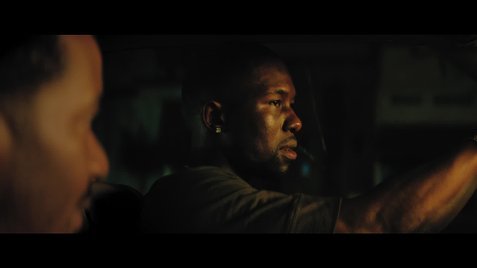
The most intimate movie of the year is about a man who has blockaded himself from intimacy. Who, because of his pain, can no more easily be embraced than beaten.
Trauma - it's understood - tends to keep us living in soft focus, because it hurts to see. It keeps us running away in evasive patterns, until we can find someplace to hide, someplace to hide even from ourselves. And that's how "Moonlight" begins - with a boy running away and hiding. From what -- we don’t yet know. We find him in an abandoned apartment, itself spoiled by the detritus of addiction. He might as well be holed up in his own mind.
But then, we see a man who sees the boy, who chases him, who invades his improvised hideout and takes him home. To us, and the boy, the man at first appears dangerous. When he's not - when he's kind - it's a crack through which the light gets in - and we spend the rest of the film waiting, watching for what will become of that sliver of light. Will it close forever, encasing the boy, the future man, in darkness? Or will it expand, until the boy, the future man, can live in light, can be seen?
Through masterful minimal storytelling - glances rather than monologues, and music diegetic not just to the action but to the characters' hearts - we are kept in suspense on that question. Until - perhaps - the very last shot. There's a reason people have been calling "Moonlight" a masterpiece.
(Directed by Barry Jenkins. Written by Barry Jenkins and Tarell Alvin McCraney. Starring Trevante Rhodes, Ashton Sanders, Alex R. Hibbert, Naomie Harris, Mahershala Ali, Janelle Monae, Andre Holland).
1 note
·
View note
Text
Paterson: A Poem About Love

"Paterson" is a movie of digressions... every one of them a love story.
Each day, Paterson wakes up in bed with his wife. He walks to work past a waterfall, in the uniform he wears as a bus driver for the city of Paterson. Before he starts his route, he writes poetry in a notebook he keeps. We see the poems on the screen, and hear them spoken, and they're beautiful. And then he goes about the real work of being a poet. Which is to say, treating each encounter, each image, each conversation - no matter how mundane, or redundant, or familiar - as discreet, and worthy of his attention.
Paterson is in love, and his wife is in love, and their bulldog Marvin is an asshole, but even he's probably in love, in his own way. And the movie is in love with all of them - in a way which is rare enough to be worth rejoicing over. Too often, movies sit in judgement of their characters. They make them do things and then they say: "Look, look at them making mistakes that you the viewer would never make".
That "Paterson" isn't like that is perhaps because it was made by one of the cinema's most exultant optimists - Jim Jarmusch. I always feel, when I'm watching his movies, like he's making us listen to a band he just discovered, or taking us for the first time to a building he found that we just have to see, because it's so beautiful and has such a story to it, and can you believe it's been right here in the city this whole time? He's been accused of being aloof, or mocking, but I don't think so. I take him at his word. I feel like he really is showing us what he's showing us because he thinks it's great.
So, what is he showing us here? A city, which has a waterfall, and crime but also art. And the people who live in that city, each of whom - at least as we meet them - are creators of their own stories, and not just the objects of observation for us, or another gaze. It's all idealized, but that's okay. Movies can be for that, too, in my opinion.
He's showing us the present, placed alongside the past as if to say - the days of our lives are like brush strokes and every day we're building on the vast mural painting that was started before we were born. Or an epic poem. Or maybe just a cacophonous drum solo with a complex time signature nearly impossible to comprehend.
I think that's what "Paterson" is about. Nothing grander, or less grand, than the rhythms of daily life. How they can make us happy or unhappy, depending on their relationship to the rhythms of our hearts.. to our lifelong efforts to keep up with, or not get too far ahead of, what makes us joyful.. and content.
(Written and directed by Jim Jarmusch. Starring Adam Driver, Golshifteh Farahani, Barry Shabaka Henley, Method Man, Chasten Harmon, Willam Jackson Harper, Masatoshi Nagase. Featuring poems by Ron Padgett and William Carlos Williams).
#paterson#jarmusch#jim jarmusch#movie review#movies#cinema#adam driver#jarmuschian#poetry#movies 2016
13 notes
·
View notes
Photo

The platonic ideal of glamour, marred by an ominous darkness at the top of the frame.
#1950's#Cinema#Debonair#Dial M For Murder#Dinner jacket#Glamour#Grace Kelly#Hitchcock#Martini#Ominous#Ray Milland#Technicolor#Tuxedo#Gentlemen
4 notes
·
View notes
Photo

Jarvis in the spotlight, writhing against a beige curtain for the crowd.
2 notes
·
View notes